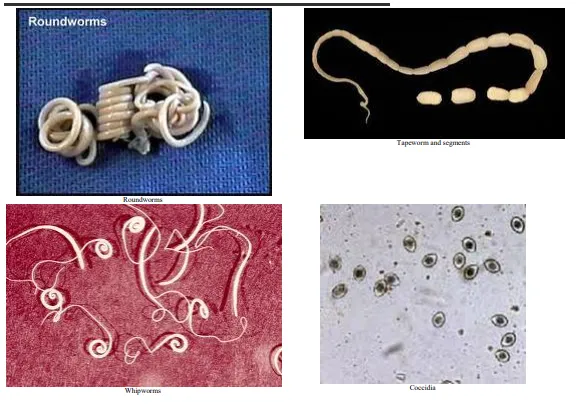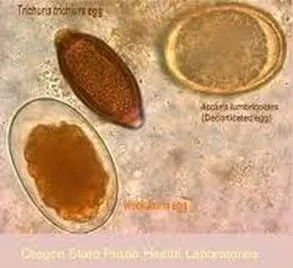We Check Your Pets For Internal Parasites
Why have a fecal exam done twice yearly?
Question: Vets typically want to a microscopic exam of a stool sample from our pets during an annual exam. I(n Alabama, warm conditions allow parasites to remain in the environment a long time, infecting pets. It can be a smelly and messy collection, and many pet owners ignore the request. How valuable a diagnostic tool is poop?
Answer: The importance of a routine fecal examination and deworming has grown in recent years.
A fecal exam is very helpful in health and disease. It will identify most gastrointestinal parasites in a healthy pet and those that may be causing disease in a sick pet with a variety of signs, including diarrhea, vomiting, poor skin and hair coat, weight loss, etc.
See more worm pictures at the bottom of this page.
Most pets acquire parasite infections from the environment because parasite eggs often can exist for long periods of time in the soil and grass. Fecal examinations in healthy pets will identify asymptomatic shedders, allowing us to treat them, eliminate shedding, serving to reduce overall contamination and exposure of other pets to infection.
Some parasites, such as roundworms and toxoplasmosis are zoonotic, meaning that if eggs are ingested by people, they can develop disease. This occurs rarely, but routine fecal examination and deworming of our pets is important to the health of our families. Furthermore, restricting access of children to contaminated areas, such as sandboxes, petwalk areas and other high-traffic areas, is important. Hookworm larvae found in the soil can penetrate into the skin and cause larvae to migrate under the skin causing inflammed tracts under the skin.
An important zoonotic parasite is the raccoon roundworm Baylisascaris. Raccoons defecate in areas called latrines, and surrounded soil can be contaminated with Baylisascaris eggs.
People should discourage raccoons from their yards but not feeding raccoons or other animals around their homes, carefully removing any raccoon fecal material, and not allowing children to play in areas where raccoons have been.
Question:What can a fecal sample tell you about a dog's health?
Answer: Fecal examination will identify internal parasites, such as worms, coccidia and giardia, and sometimes larvae such as lung worms. We can see the white segments of the dog and cat tapeworms in fresh stool samples.
In puppies, parasite infections often come from the mother, so the health of the puppy and bitch can be assessed by a fecal examination.
But the exams do not identify all infections, and, thus, routine deworming is important even if fecal tests are negative.
This is particularly important in the puppy and in recently infected older dogs. In these dogs, worms are present in the intestines but they are not yet shedding eggs, resulting in a negative fecal examination.
Our common antiparasiticals have become so much more advanced in recent years. They are safe and effective with very few side effects.
They are easier to administer and kill and prevent more infections. However, the fecal examination remains important to make sure we are treating the dog or cat with the most appropriate antiparasitical.
Clients should seek advice from their veterinarian on which dewormers are best. There are many out there, some of the over the counter products are less effective than others, and the veterinarian's advice can save costs by making sure the right one is selected from the beginning. We also have to be careful with cats and make sure they receive dewormers appropriate for the feline.
Question: What can't a fecal sample tell you?
Answer: There are other causes of diarrhea, including pancreatic insufficiency, small intestinal disease, hormonal problems, even cancer. Routine fecal examination will not diagnose these. Bacterial causes of diarrhea are rare in small animals. A fecal culture, looking for unusual bacteria in the stool, is needed to diagnose a bacterial diarrhea. Parvovirus diarrhea is not diagnosed on a routine fecal examination, but there is another fecal test for this viral diarrhea.
Question: What specifically are you looking for in fecal tests?
Answer: We are looking for larvae of worms, small, moving organisms such as tritrichomonas and giardia as well as the eggs of common gastrointestinal parasites.
Question: Is one stool sample usually enough?
Answer: Generally, yes. Sometimes we prefer to check multiple fecal samples because shedding may be intermittent, which can be the case with a giardia infection or whipworm infection. In a patient with diarrhea, we may end up treating for gastrointestinal parasites even though a fecal sample is negative because a negative result does not absolutely rule out all parasites.
Question: What kinds of common issues are typically found?
Answer: The worm eggs: roundworms, hookworms, whipworms, and protozoa: coccidia
and giardia are often found in small animals.
These must be distinguished from common contaminants in stool, including environmental yeasts and fungi, pollen and other plant material, grain mites and parasites of other species (such as rodents, amphibians, large animals and horses) that are acquired from eating the species (i.e. frogs) or their stool (sheep and cattle).
Parasites from other species are just passing through, cause no disease in the dog and cat and do not require treatment.
Question: What are some of the more unusual diseases detected?
Answer: We can occasionally find organisms that are not related to the gastrointestinal tract, such as skin parasites like demodex and sarcoptes. These are mites that are usually picked up in skin scrapings made of the skin, placed in mineral oil on a microscope slide and examined under a microscope. Sometimes the itching dog or cat will ingest these mites, they will pass unchanged through the gastrointestinal tract, and we will find them in the stool. Pretty cool.
We have occasionally seen a huge load of worm eggs from a species other than the one being sampled, such as deer worm eggs seen in the feces of a dog that routinely ingests deer poop!
We occasionally also see eggs that might cause significant disease in a sheep, goat or llama -- in the stool of a dog. It is not necessary to treat the dog for the parasite, because these worms are generally species specific and only cause a problem in the natural host, but it is important to contact the owner of the pasture and have them do a routine deworming of their livestock.
Question: What is the worst thing it can reveal?
Answer: Sometimes we see such large infestations of parasites that the patient must be really ill. Overwhelming gastrointestinal parasitism can cause severe illness and death, particularly in young and immunocompromised patients. Cats in the Southeast sometimes eat lizards that harbor liver flukes. Any time we find an outdoor cat with liver disease and yellow membranes, we will check a stool sample for liver flukes.
Question: Which diseases, parasites, etc., can only be detected in an analysis of poop?
Answer: We can only detect the presence of gastrointestinal parasites, such as worms, trichomonads, coccidia, etc., by a fecal examination. There are no blood tests for these organisms.
Question: Are there any situations in which diseases/problems can be caught early by examining poop, before more serious symptoms develop?
Answer: We can occasionally detect fecal parasites before we see signs of disease such as diarrhea, blood in the stool, weight loss, poor skin and hair coat and condition, etc. In addition -- and more importantly -- some parasites are zoonotic, meaning they can cause an aberrant infection in man, such as roundworms and certain hookworms. Thus we do want to make sure our pets are parasite free by performing routine fecal examinations and deworming.
Question: Vets usually want the samples to be "fresh." Why?
Answer: Even the finding of one egg can be diagnostic, thus we want the samples to be fresh. With time, samples and eggs dry out and disintegrate. Also, fecal samples in the environment can quickly become contaminated with fly eggs, free living larva or worms from the soil, and other contaminants that can be confused with real parasites.
Question: What is the best way to collect a sample? What do you suggest it be scooped up with?
Answer: We will normally take a sample of your dog's poop right in our office. If you want to drop off a sample, the sample can be scooped up with anything clean and submitted in a clean dry cup of any type with a lid, or even a plastic bag. The key is to not gather up too much of the environmental contamination, such as leaves and dirt and litter box clay. We usually only need one to six grams of a sample, thus the owner does not need to provide a huge amount. When there is diarrhea, the sample size should be larger. With firm stool, we need less.
Question: What is the best sanitary way to keep a sample if you can't get to the vet immediately?
Answer: Keep the sample in a container with a lid, or in a bag that is closed. I would keep it in a cool place. As pets defecate at least one to two times a day, samples should be collected on the day they are submitted or the day before so they shouldn't need to be kept for long periods of
time.
Question: How is a fecal sample prepared for review?
Answer: Fecal samples are analyzed in our laboratory in about 10 minutes. The basic technique of the fecal procedure is to first identify any large parasites within the sample. We may take a small sample, mix it slightly with water and do a direct examination under the microscope for any moving parasites. Then, another small sample is prepared for a fecal flotation. A flotation technique uses a solution of sodium nitrate and we either do a fecal floatation (the sample sits on the counter for a given length of time to allow the eggs to rise to the top of the container) or we centrifuge the sample to separate parasite eggs from debris in the sample. The eggs are harvested and we identify them under a microscope by egg size and morphology.
Dr. Sandy Willis
Question: How much does an analysis usually cost?Answer: At Animal Hospital of Montgomery, a fecal floatation is $20.00.


